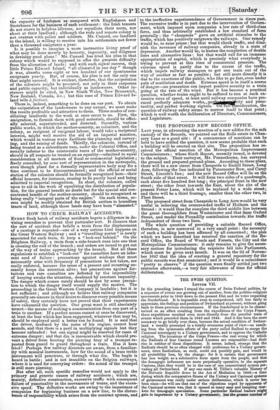HOW TO CHECK RAILWAY ACCIDENTS.
EVERY fresh batch of railway accidents begets a diligence in de- vising remedies to prevent that particular sort. It chances that the sort of accident that befalls a train from the displacement of a carriage is repeated—one of a very serious kind happens on the Great Western Railway ; and a "travelling porter" is newly appointed for each train, to keep a "look-out behind." On the Brighton Railway, a train from a aide-branch runs into one that is crossing the end of the branch ; and orders are issued to get out of the way of trains approaching by the branch. But all these regulations to establish a "look-out' for casualties have an inhe- rent seed of failure : precautions against mishaps that must necessarily arise with frequency if precautions be not taken, are easily enforced, because the sense of a present and recurring ne- cessity keeps the attention alive ; but precautions against for- tuitous and rare casualties are defeated by the impossibility of keeping awake the attention, deadened by constant impunity. The danger which comes rarely should be met by some precau- tion to which the danger itself would supply the motive. The proceeding in the Great Western Company is laudable ; but it is not sufficient ; and although we believe that railway companies generally are sincere in their desire to discover every possible means of safety, they certainly have not proved that their experiments have exhausted the question. One great want is still absolutely unmet—the means of making a communication from one part of a train to another. If a perfect means cannot at once be discovered, at least the best which has been suggested, whatever that may be, should be employed until a better can be found. It is said that the driver, deafened by the noise of his engine, cannot hear sounds, and that there is a peril in multiplying signals lest they become unheeded : but one signal might be reserved for cases of extreme danger; and that din is inconceivable which should pre- vent a driver from hearing the piercing bray of a trumpet re- peated from guard to guard throughout a train. Has it been tried? Perhaps few railway directors are aware, from a familiar- ity with musical instruments, how far the sound of a brass treble instrument will penetrate, or through what din. The bugle is heard in battle; and is not inaudible on the Belgian railways, where it is used for conveying orders : the sound of the trumpet is still more piercing.
But after all, such specific remedies would not apply to the primary and generic causes of railway accidents ; which are, mainly, defective construction, excessive traffic with consequent failure of punctuality in the movements of trains, and the exces- sive speed. The defective works are owing to the impatience of companies for beginning business on a new line, to the distur- bance of responsibility which arises from the contract system, and
to the ineffective superintendence of Government in times past. The excessive traffic is in part due to the intervention of Govern- ment, which imposed upon companies a low rate of third-class fares, and thus arbitrarily established. a low standard of fares generally : the " cheapness" gave an artificial stimulus to the traffic, which has positively outgrown the railways. One-remedy would be, to raise prices : but that would check traffic, and dimi- nish the revenues of railway companies, already in a state of depression. Another would be, to hasten the completion of double lines and alternative lines : but that would call for an immense appropriation of capital, which is precisely what everybody is trying to prevent at this time of commercial pressure. The extreme speed is partly due to the excess of the traffic, which impels railway managers to get one train out of the way of another as fast as possible ; but still more directly it is due to the exactions of the public, who like to go fast, even under pain of mutilation and death. Extreme speed is in itself a source of danger—no precaution can impart positive security to a train going at the rate of the wind. But it has become a practical question, whether trains ought to be suffered to run at such ex- cessive rates of speed, at least until railway companies have pro-
cured perfectly adequate works„.p_e "ty and punc- tuality, and perfect working signals. On u rrsideration, the question of railway safety.seems to narrow itself to that point ; which is well worth the deliberation of Directors, Commissioners, and Legislature.


























 Previous page
Previous page